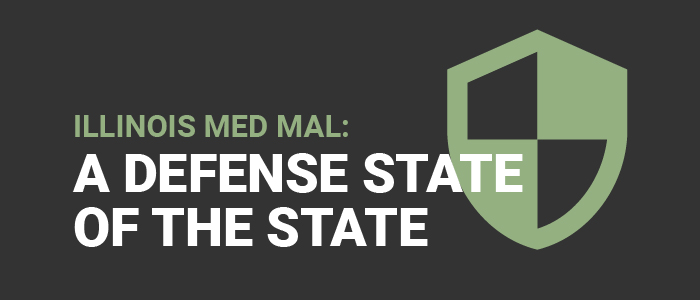Illinois Med Mal: A Defense State of the State

It’s no secret that Illinois is a plaintiff-friendly state. While true in several types of litigation, it is especially true for medical malpractice plaintiffs.
One indicator of the volume of malpractice litigation in the state can be found in Medscape’s 2021 Malpractice Report. The online health information giant surveyed 4,300 physicians nationwide between May and August 2021, asking if they’d been sued for malpractice in the prior year.
The report ranked Illinois fourth in the country for the prevalence of its doctors which reported being sued for malpractice. The top spot went to its next-door neighbor, Indiana, which was followed by New York and Pennsylvania.
Medscape noted that the prevalence of medical malpractice litigation in a state is tied to the extent of tort reforms, the number of doctors in the state, patient demographics, and legislatures’ efforts to cut down on frivolous litigation.
Illinois’ legislature and governor have been panned by groups that support tort reform, which would make it more difficult for injured parties to sue doctors and health systems, among other parties.
In December, the American Tort Reform Foundation, ranked Cook, Madison and St. Clair Counties in fifth place on its 2021-2022 Judicial Hellholes list, a jump from 8th place the prior year.
The group, which advocates for tort reform nationwide, places jurisdictions on the Judicial Hellholes list which it says are known for allowing innovative lawsuits, welcoming litigation tourism and expanding civil liability.
While the counties were largely listed for asbestos litigation and Illinois Biometric Information Privacy Act lawsuits, the group took swings at the Illinois General Assembly, which it deemed “one of the most plaintiff-friendly legislatures in the country” and Gov. J.B. Pritzker, whom the group asserted “supports a liability-expanding agenda to the detriment of Illinois citizens and small businesses.”
The group also marked the 20th anniversary of the Judicial Hellholes report by compiling an Everlasting Judicial Hellholes list of repeat offenders, including Illinois on the list.
In its rationale, it said that a jurisdiction from the state has been on each report since its inception and added that the Illinois plaintiffs’ bar is one of the most powerful in the country in terms of political influence, giving millions of dollars to lawmakers and office seekers.
One recent example of plaintiff-friendly legislation went into effect last summer after Gov. J.B. Pritzker signed into law a bill allowing plaintiffs to collect six percent prejudgment interest on judgments they receive for their personal injury and wrongful death lawsuits.
The law, Senate Bill 72, took effect July 1, 2021. Previously, Illinois law only allowed plaintiffs to receive nine percent interest post-judgment.
Proponents of the law, including the Illinois Trial Lawyers Association, said the law would incentivize earlier resolution of cases through settlement.
In a column for the Chicago Daily Law Bulletin, ILTA President J. Matthew Dudley explained that under the new law, defendants are provided a set off on prejudgment interest if they make a plaintiff a written settlement offer within the first 12 months that the case is pending. If the plaintiff rejects the offer, the set off will only accrue on the difference between the highest written offer and the case’s final judgment.
For the defense bar in Illinois, it will be key for health care clients to come to the negotiating table early. Early claims investigation is vital to that effort, including assessing the standard of care, causation and damages.
Our team at Med Law Advisory Partners has the necessary expertise to conduct thorough medical record reviews. Our consulting nurse experts draw on their skills and experience to research the standard of care and identify any deviations from it in the care a patient received.
If deviations exist, the legal nurse consultant determines whether they are relevant to the facts of the case and offers defense counsel an informed opinion on it.
Once the legal nurse consultant has weighed in on the standard of care, he or she, along with the team, investigates whether the elements of negligence have been met. Consulting nurse experts can be instrumental in proving or disproving whether any breach caused the injury claimed and the extent of any damages.
Specifically, he or she can determine the proximate cause, the result that directly produced an event that would not have otherwise occurred. In medical cases, the event is usually a physical injury or harm. The legal nurse consultant identifies the factors that directly contributed to the injury or harm from the record and other evidence.
Early claims assessment can dramatically impact the expenses in a medical negligence/malpractice case. With the new prejudgment interest law in place in Illinois, it only benefits defendants to get your ducks in a row early.
Contact us today to learn more about how we can help in your medical malpractice matter.